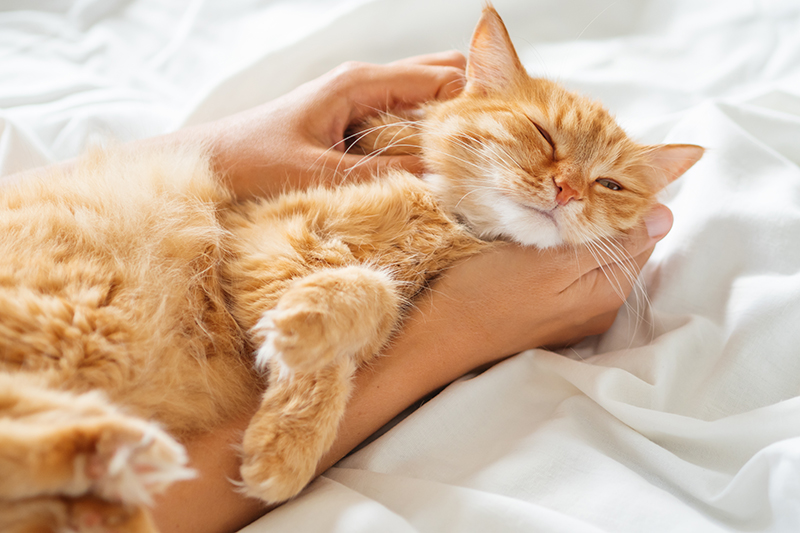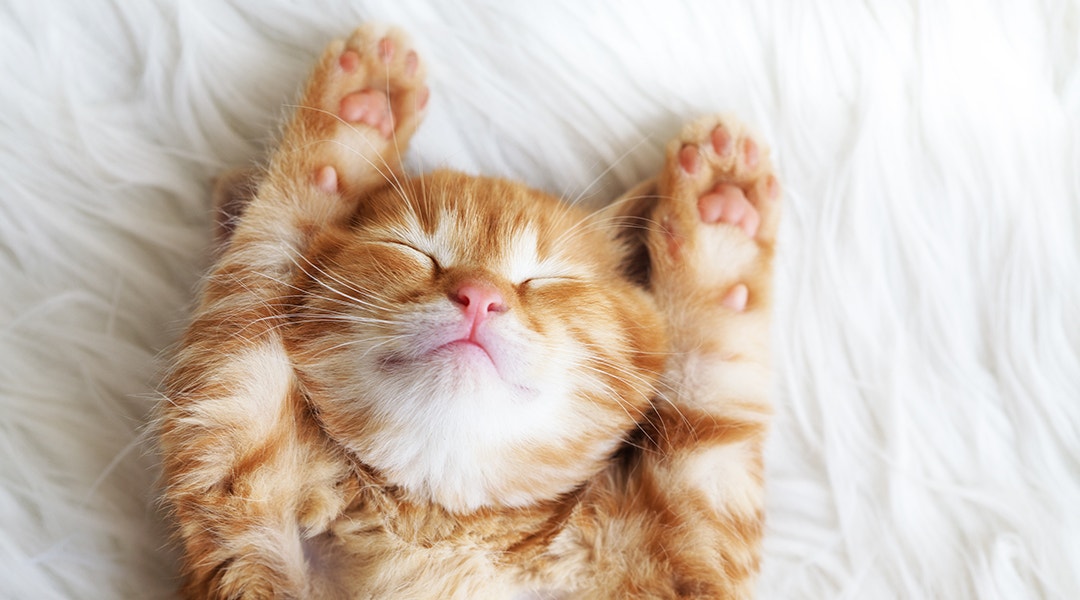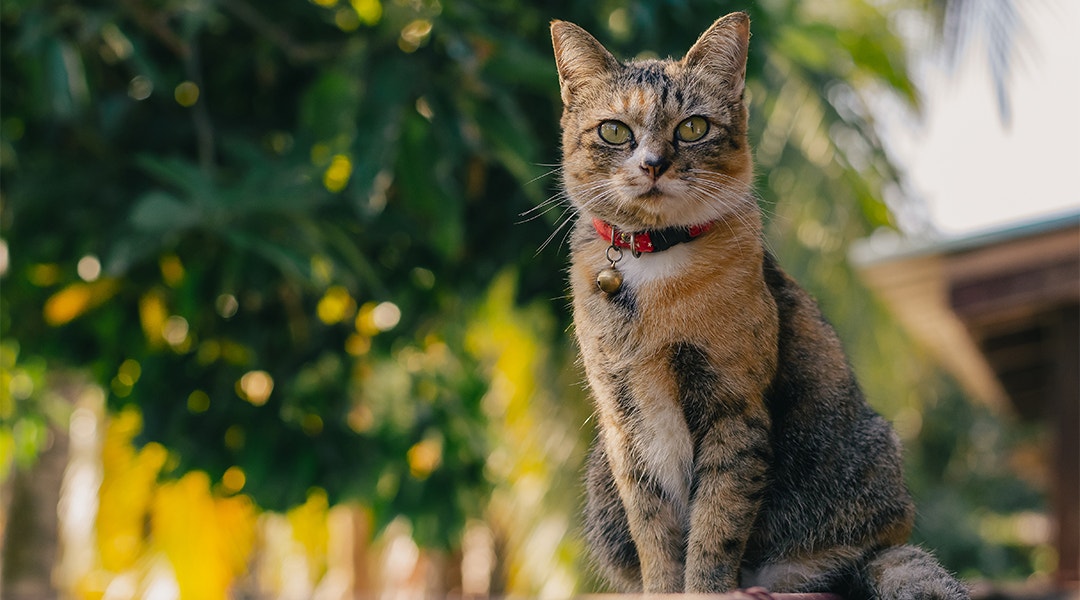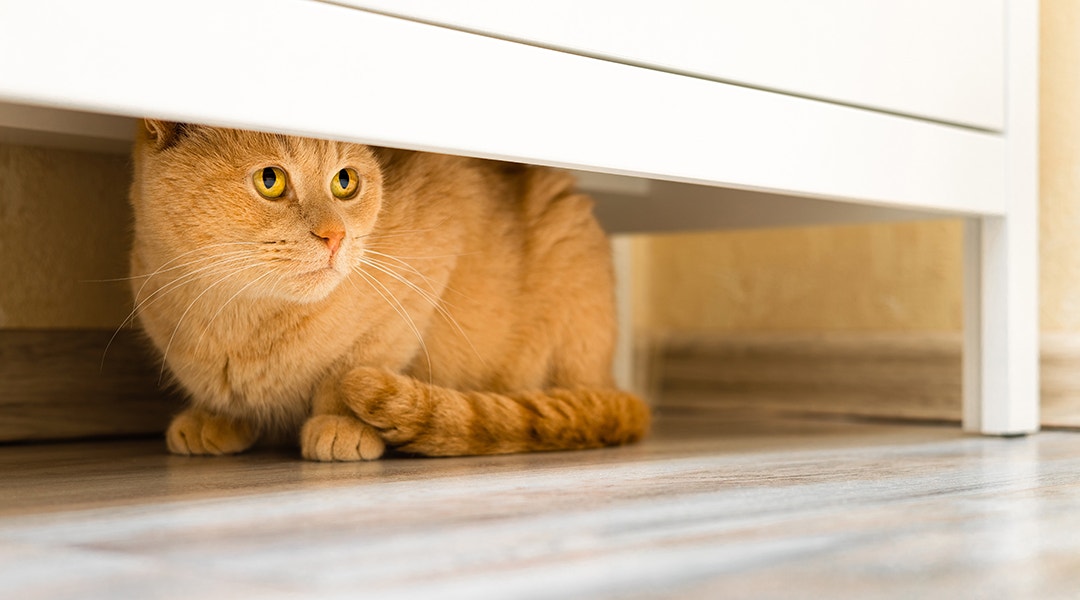Cat owners are often bemused and intrigued by the sleeping habits of their cats! “Everybody wants to be a cat” is a popular phrase because we are fascinated by the relaxed habits of cats, particularly their sleeping schedules, behaviours and positions. Cats spend the majority of their days sleeping, with approximately 16-20 hours dedicated to resting, so understanding more about the secrets of cat’s sleeping habits is important.
Why does my cat sleep on me? The different places cats choose to sleep are rooted in instinctual, emotional, and practical reasons. In this article, we will explore the most popular cat sleeping positions and explain what they tell you about your cat’s special bond with you. Understanding where your cat sleeps and why can help you appreciate their needs and personality, ultimately strengthening your bond.
Understanding how cats sleep?
Cats have different sleep cycles, which are similar to humans. How long cats sleep depends on their age, with kittens and senior cats generally sleeping more than adult cats. For example, newborn kittens require nearly 22 hours of sleep a day, and senior cats may sleep up to 16-20 hours. Adult cats sleep roughly 12-18 hours a day, averaging at 16 hours.
Light sleep (Non REM sleep): Light sleep often lasts between 15 and 30 minutes before your cat transitions into a deeper sleep. During light sleep, cats will remain alert and will respond to anything in their environment that provokes their sharp senses, such as lights, sounds and movements. This is due to their natural survival instincts. Light sleep allows cats to rest while staying alert to potential threats, thanks to their predatory instincts (hunting behaviours).
Deep sleep (REM sleep): After around 30 minutes of light sleep, a cat will enter deep sleep, this is also when dreams can occur! During deep sleep, their body will become much more relaxed, and they will be less easily startled; their eyes will also remain closed. During REM sleep, your cat may display involuntary twitches, usually affecting their whiskers, ears, and legs/feet. This is a good indication they are in REM sleep and may be dreaming. Your cat may also snore during this stage!
Common cat sleeping positions and what they mean?
Curled up position
Why does my cat sleep curled up at my feet? Cats sleep in a curled up position (nose to tail) to conserve their body heat. This secure position, which is often described as a croissant or crescent shape, also protects their vulnerable areas (the stomach, chest and vital organs). However, it is also one of the most common sleeping positions and indicates comfort!
Stretched-out sleep
Why does my cat sleep next to me in a stretched out position? When a cat stretches out when they are sleeping, this indicates they have a lot of trust in you! As we mentioned previously, a cat’s vital organs, stomach and chest are vulnerable areas that they only expose when they feel very safe and secure. Cats also find strange positions comfortable, as they are very flexible animals!
Belly-up sleep
Why does my cat sleep on me with their belly up? It is safe to say, similarly to the previous sleeping position, finding your cat sleeping belly up is a true compliment as it shows they trust you completely. The belly up sleeping position indicates they feel completely secure around you and their surroundings, as the vital organs are very exposed. Cats may also sleep belly up when it is very hot to help them regulate their body temperature. It’s safe to say your cat feels extremely relaxed and safe around you.
Perched or semi-alert sleep
Why does my cat sleep next to me in a perched or semi-alert state? Cats will generally sleep perched on furniture, as it gives them a good vantage point of their environment. Cats are predators and this position makes them feel safer as they can scan the environment for other animals, children or visitors to your home. Cats have different sleep states, including light sleep and deep sleep, semi alert sleep would be regarded as light sleep, this is when they are resting but still very aware of the movements and sounds around them.

What does it mean if a cat sleeps on you?
Does my cat sleep on me because they trust me? Yes! You may also notice that they drool on you in their sleep when they are extremely relaxed and feel safe. Did you know cats may even lick themselves in their sleep? Observing exactly where your cat sleeps can give you more information about your bond and their mood! Learning more about the reasons behind their preferred sleeping positions helps you understand them better and can strengthen your bond with your cat.
Why does my cat sleep on my feet?
Many owners wonder, “why does my cat sleep at my feet?” The simple answer is for warmth and security! If your cat chooses to sleep by your feet, they feel comfortable and safe around you, it is also a sign of affection. This sleeping position gives them proximity to you and simultaneously provides them with a good vantage point. Our feet are generally warm, so it also allows them to enjoy our body heat, too. It is also less intrusive or awkward than sleeping on other body parts, cats are aware of this, and it makes sleeping at our feet a preferred spot!
Why does my cat sleep on my chest?
Cats sleep on our chests because they enjoy the intimacy. This sleeping position is closer to our heartbeat and breath, the rhythm and togetherness comforts them! It also allows them to enjoy your body heat and calming energy, too. If your cat loves to sleep on your chest regularly, it’s a huge compliment!
Why does my cat sleep on my bed?
Cats love routine, so if they have access to your bedroom and prefer to sleep there, they will usually make a habit of it. Cats generally prefer being near their owners during the night, this indicates the close bond they share with us and their desire for closeness and company. They also love to be near our body heat, of course! Sleeping near their owners also provides them with security from predators and makes them feel safe enough to enjoy a deep, restful sleep. Cats may also adjust their sleeping patterns to match their owners.
Why does my cat sleep on my pillow? For the same reasons as previously mentioned! This position is similar to cats sleeping on our chests, but allows them more peace if you tend to move around in your sleep. It is also less intrusive. Our pillows hold our scent and warmth, which appeals to our feline friend, too.
What does it mean if my cat doesn’t sleep with me?
Why does my cat not sleep on me? Cats are unique and independent creatures with their own individual personalities. Some cats may just prefer more solitude than others and will choose to sleep in another spot in the home that they feel safe in, such as a cat bed or the sofa. During the summer, they may also seek out cooler places in the home, as bedrooms can heat up quickly. Certain cats may prefer higher ground, such as window ledges, cat trees or peaceful hidden corners of the home. It is important to try not to feel rejected if your cat prefers to sleep alone, some owners may even prefer this arrangement! It just means your cat’s preferences are slightly different. Cats may even alternate between sleeping on the bed, outside the bedroom and on ledges, depending on their mood and the weather. You can always entice them to spend more quality time with you by using some treats and engaging them with playtime.
Pros and cons of letting my cat sleep with me?
Depending on your personal preferences and your cat's preferences, there are pros and cons to letting your cat sleep next to you or in your bedroom generally. As charming as it is to have your cat sleeping on your chest for warmth, it’s important to remember that every cat-human relationship is different, and sleeping routines may also change. Positive reinforcement with treats can help you achieve your ideal sleeping arrangement, however we always advise you aim to respect your cats boundaries.
Pros: Sleeping near your cat can provide stress reduction for both of you! It also enriches your emotional bond, providing both parties with comfort, security and warmth (especially in the winter!)
Cons: Sleeping near your cat may affect people with allergies more. It can also lead to disturbed sleep for some cat owners, as your cat may get the zoomies or wake you up during the night. You may also wake up your cat if they fall asleep near you and you move during your sleep. There are also hygiene considerations to be aware of. You should aim to keep your cat’s litter tray very clean so they don’t track any dirt into the bed. You should also aim to clean your bed regularly to limit the spread of germs.
Tips for encouraging healthy sleeping habits
There are several different ways you can enrich your cat’s sleeping habits and create healthy routines.
- Routine play before bed can help your cat unwind and may prevent them from getting the zoomies and disturbing your sleep.
- Creating a comfortable sleeping space that includes soft cat beds, blankets, or elevated spots for sleeping is also key. Especially if you would like to discourage your cat sleeping on your pillow due to allergies or other reasons!
- Always remember that understanding and embracing your cat's sleeping preferences and behaviours improves harmony within your home.
Conclusion - Cat sleeping behaviour
Ultimately, different cats have unique sleeping routines, from cats sleeping at your feet to cats sleeping on your pillow or preferring to sleep on an elevated space / outside of the bedroom entirely. You can also use positive reinforcement with treats to achieve your ideal sleeping situation, however, observing your cats habits and understanding the motives behind them is key to providing a safe and comfortable environment that respects their preferences. Sleeping spots may also change throughout the night or as your cat grows older. As we have mentioned previously, understanding the meaning behind different cat behaviours ultimately strengthens your special bond overall!
FAQ - The Secret To Cat Sleeping Behaviour
Do cats sleep on their favourite person?
Yes! Cats often sleep near their favourite person for security, comfort and warmth. This sleeping position indicates your strong bond and the trust they have in you. Take this as a compliment if you often find your cat sleeping near you, you make them feel safe and loved!
Why does my cat like to sleep on top of me?
Your cat likes to sleep on top of you for security, comfort and warmth! This close proximity makes them feel safe, and they may also find your heartbeat and breath comforting. However, this may not be the best position if you move in your sleep!
Is it good to let your cat sleep on you?
If your cat prefers to sleep on you, it means they have a very strong bond with you and trust you completely. It is a good idea to respect their boundaries and let them indulge in the sleeping position that makes them feel safe and secure. However, it may cause some issues for you in terms of hygiene, allergies or sleep disturbances. Playing with your cat before bed and ensuring they are well-groomed and vaccinated, alongside keeping a clean litter tray, can help mitigate these issues.
Do cats lie on your chest to heal you?
No, cats lie on your chest because they trust you and feel safe and secure around you! They also love listening to your heartbeat, the rhythm of your breath and feeling your body heat against them.












